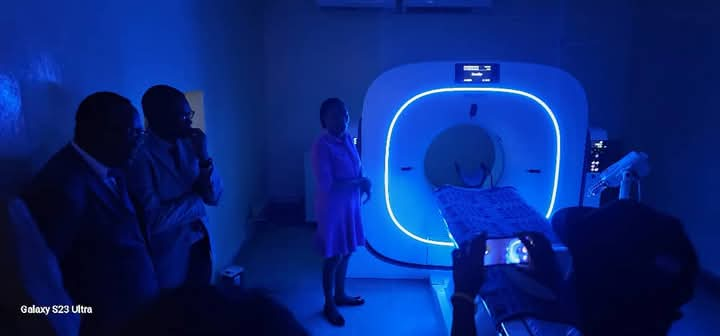The Ministry of Health has taken another significant step in enhancing Zambia’s healthcare system with the installation of advanced diagnostic equipment at Kabwe Central Hospital. The Permanent Secretary for Technical Services, Dr. Kennedy Lishimpi, recently inspected the hospital’s newly installed medical equipment, including a state-of-the-art CT scan machine and an oxygen plant currently under construction.
During his visit, Dr. Lishimpi emphasized the importance of modernizing diagnostic services across public hospitals. A key initiative in this effort is the implementation of a Picture Archiving and Communication System (PACS) to centralize CT scan images nationwide. This system will enable hospitals to transmit scan results to radiologists in Lusaka or Ndola, ensuring reports are generated within 24 hours. He further highlighted the need for hospitals to provide report CDs and seamlessly share both images and reports with doctors, facilitating timely and accurate diagnoses.
The Permanent Secretary commended the rapid progress in equipping healthcare facilities, citing Kabwe Central Hospital’s new CT scan machine as a milestone in Zambia’s medical advancements. He noted that every province now has at least five operational digital X-ray machines, significantly improving radiology services nationwide.
Beyond radiology, the Ministry has also prioritized the installation of ultrasound scanners, with ongoing setups at Chinsali General Hospital, Chipata Central Hospital, and multiple facilities in Southern Province. Additionally, hospital theater upgrades are in progress, with Siavonga District Hospital now equipped with a modern theater, and Livingstone Teaching Hospital completing the installation of two new surgical theaters.
To further strengthen surgical and critical care services, the Ministry has provided new anesthesia machines, theater beds, theater lighting, and other essential medical equipment. These improvements are set to enhance the quality of patient care, boost public confidence in healthcare services, and ensure that medical facilities across Zambia are equipped to handle complex procedures.
The government remains committed to strengthening Zambia’s healthcare infrastructure. Through the deployment of cutting-edge diagnostic tools, the establishment of a national CT scan archive, and continuous upgrades to hospitals, the Ministry of Health is working towards a more efficient, accessible, and high-quality healthcare system for all citizens.
Ministry of Health Zambia







OTHER ARTICLES
Editorial — Prevent, inform, and act for women’s health in Africa
Kenya : Government Prioritises Maternal Health and Strengthens Support for Community Health Promoters
Strengthening pandemic prevention, preparedness, and response capacities in Senegal using the “One Health” approach